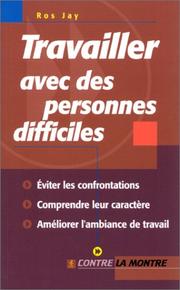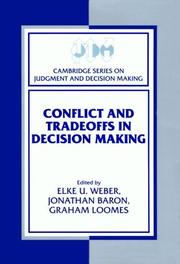| Listing 1 - 10 of 317 | << page >> |
Sort by
|
Book
ISBN: 2850085669 9782850085666 Year: 2005 Publisher: Lyon: Chronique sociale,
Abstract | Keywords | Export | Availability | Bookmark
 Loading...
Loading...Choose an application
- Reference Manager
- EndNote
- RefWorks (Direct export to RefWorks)
Book
Year: 1950 Publisher: New York : Philosophical Library,
Abstract | Keywords | Export | Availability | Bookmark
 Loading...
Loading...Choose an application
- Reference Manager
- EndNote
- RefWorks (Direct export to RefWorks)
"We hope this book is at least a mediocre attempt toward introducing an idea that will change the meaning of social and personality conflicts as radically as did Freud when he reported an hysterical symptom is effected by a motive and not a neutral mechanism or an inherently weak neurology. The symptom, said Freud, is related to a dynamic psychology, a purpose. This discovery has not been, and probably never will be, refuted. The question still remained, however. What is this purpose? With, and since Freud, attempts were made to answer this question in terms of forces that are distinctly genetic and individualistic in nature. That is, what should have been an antiquated form of atomism was taken for granted. Our solution is radically different. Our basic premise is that the current group life is the ultimate, that any tendency must be traced to this totality. The symptom is both anticipated and nourished by the total group setting. When we look at a neurotic, for example, we do not ask what is wrong with that person, what are his weaknesses? Rather, we ask, what are the nature of those group forces which, when they meet at the point represented by our subject, effect what is called a neurosis? We ask, why are there conditions that at times make it necessary for the individual to live a neurotic role in order that he may do the in inevitable, adjust to and contribute toward the group life? In a sense, then, in perspective, the purpose behind the symptom is the purpose behind all behavior, the need to preserve the whole, the need to contribute toward the dynamic cohesiveness that dominates all life. If the symptom has purpose, then it also has social utility"--
Book
ISBN: 9783347389137 Year: 2021 Publisher: Hamburg, Germany : Tredition Verlag,
Abstract | Keywords | Export | Availability | Bookmark
 Loading...
Loading...Choose an application
- Reference Manager
- EndNote
- RefWorks (Direct export to RefWorks)
Book
Abstract | Keywords | Export | Availability | Bookmark
 Loading...
Loading...Choose an application
- Reference Manager
- EndNote
- RefWorks (Direct export to RefWorks)

ISBN: 284211132X 9782842111328 Year: 2001 Publisher: Paris: Village mondial,
Abstract | Keywords | Export | Availability | Bookmark
 Loading...
Loading...Choose an application
- Reference Manager
- EndNote
- RefWorks (Direct export to RefWorks)
Book
ISBN: 0691166048 9780691166049 0691189056 0691216886 Year: 2019 Publisher: Princeton University Press
Abstract | Keywords | Export | Availability | Bookmark
 Loading...
Loading...Choose an application
- Reference Manager
- EndNote
- RefWorks (Direct export to RefWorks)
An in-depth look at the historic and strategic deployment of rights in political conflicts throughout the world. Rights are usually viewed as defensive concepts representing mankind's highest aspirations to protect the vulnerable and uplift the downtrodden. But since the Enlightenment, political combatants have also used rights belligerently, to batter despised communities, demolish existing institutions, and smash opposing ideas. Delving into a range of historical and contemporary conflicts from all areas of the globe, Rights as Weapons focuses on the underexamined ways in which the powerful wield rights as aggressive weapons against the weak.Clifford Bob looks at how political forces use rights as rallying cries: naturalizing novel claims as rights inherent in humanity, absolutizing them as trumps over rival interests or community concerns, universalizing them as transcultural and transhistorical, and depoliticizing them as concepts beyond debate. He shows how powerful proponents employ rights as camouflage to cover ulterior motives, as crowbars to break rival coalitions, as blockades to suppress subordinate groups, as spears to puncture discrete policies, and as dynamite to explode whole societies. And he demonstrates how the targets of rights campaigns repulse such assaults, using their own rights-like weapons: denying the abuses they are accused of, constructing rival rights to protect themselves, portraying themselves as victims rather than violators, and repudiating authoritative decisions against them.

ISBN: 0521772389 9780521772389 Year: 2001 Publisher: Cambridge: Cambridge university press,
Abstract | Keywords | Export | Availability | Bookmark
 Loading...
Loading...Choose an application
- Reference Manager
- EndNote
- RefWorks (Direct export to RefWorks)
Book
ISBN: 9782952155601 2952155607 Year: 2003 Publisher: Rennes: Presses universitaires de Rennes,
Abstract | Keywords | Export | Availability | Bookmark
 Loading...
Loading...Choose an application
- Reference Manager
- EndNote
- RefWorks (Direct export to RefWorks)
Book
ISBN: 0822302446 Year: 1971 Publisher: Durham (N.C.) : Duke university press,
Abstract | Keywords | Export | Availability | Bookmark
 Loading...
Loading...Choose an application
- Reference Manager
- EndNote
- RefWorks (Direct export to RefWorks)
Book
Year: 1965 Publisher: Princeton, N.J. : Van Nostrand,
Abstract | Keywords | Export | Availability | Bookmark
 Loading...
Loading...Choose an application
- Reference Manager
- EndNote
- RefWorks (Direct export to RefWorks)
| Listing 1 - 10 of 317 | << page >> |
Sort by
|

 Search
Search Feedback
Feedback About UniCat
About UniCat  Help
Help News
News